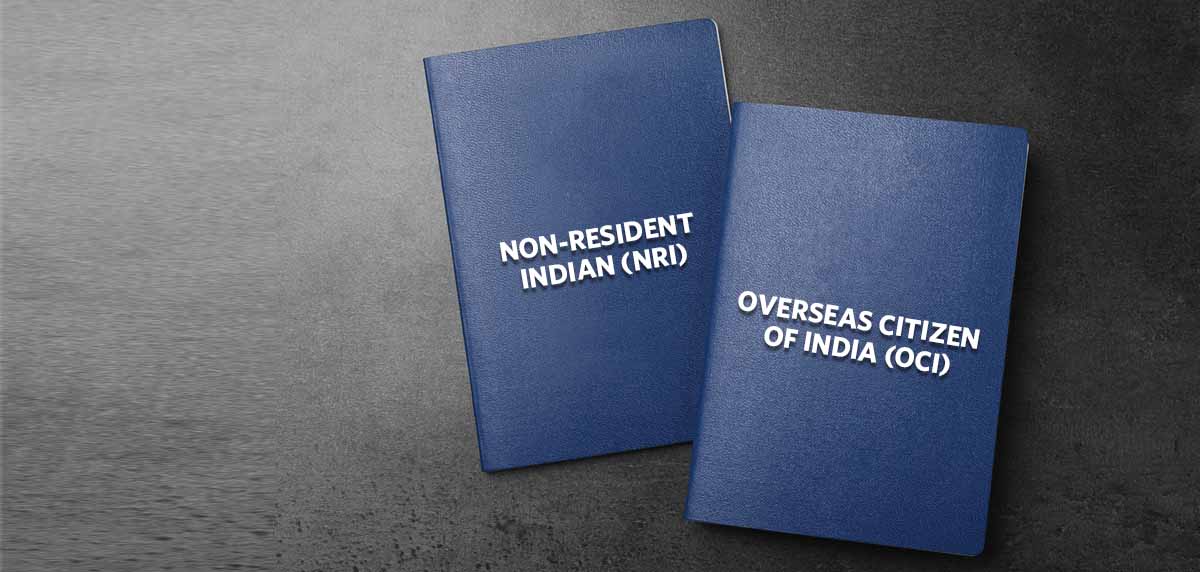India has a huge diaspora across the globe. Whether it is the bylanes of Boston or the streets of Sydney, you will find an Indian community in almost every corner of the world. This wide diaspora has led to terms like Non-Resident Indian (NRI) and Overseas Citizen of India (OCI) being used very commonly. Both these terms refer to the status of an individual who is residing outside of India. It establishes their relationship with India regarding their legal citizenship and the rights they have within the country.
Many people may think that ‘NRI’ and ‘OCI’ mean the same thing. While both do have their roots in India, there are major distinctions in their legal status, rights, and privileges. Let’s learn more about the difference between an NRI and an OCI.
Who is a Non-Resident Indian (NRI)?
- An NRI is an Indian citizen who resides outside India for various reasons such as employment, education, or other commitments.
- According to the Income Tax Act, an individual is considered an NRI if they have lived in India for less than 182 days in a financial year.
- Despite living abroad, NRIs retain their Indian citizenship and the right to vote in Indian elections.
Who is an Overseas Citizen of India (OCI)?
- An OCI is a foreign national of Indian origin (or connected to such an individual in a specified manner) who has been granted permission to live and work in India.
- A person is eligible for an OCI card if they or their ancestors were Indian citizens on or after January 26, 1950, or belonged to territories that became part of India after August 15, 1947. Children, grandchildren, great-grandchildren, and minor children of such individuals also qualify. Additionally, a foreign spouse of an Indian citizen or an existing OCI cardholder is also eligible if the marriage has been registered and has lasted continuously for at least two years.
- The OCI status allows individuals with Indian ancestry to maintain a connection with India without granting them full citizenship. OCIs are provided with an OCI card, which acts like a lifelong, multiple-entry visa allowing them to visit India for various purposes.
- It is crucial to note that OCIs do not have political rights and hence, they cannot vote in India.
Key Differences Between NRIs and OCIs
Let’s explore the major points of difference between an NRI and an OCI.
Parameter
| NRIs
| OCIs
|
Eligibility
| An NRI (Non-Resident Indian) is an Indian citizen who resides outside India for work, business, or other purposes and spends less than 182 days in India in a financial year.
| An OCI (Overseas Citizen of India) is a foreign national of Indian origin (or a spouse of an Indian citizen or OCI cardholder) who has been granted a lifelong visa and certain rights in India. |
Application Process
| There is no application to become an NRI.
| To receive the OCI card, individuals must apply through authorised centres and submit an extensive list of documents. |
Proof of Status
| NRIs use Indian passports as proof of identity. However, they may need to provide a visa, or other documents, related to the foreign country when required.
| OCIs are issued a separate OCI card as official proof of their status. However, they must also have their foreign passport. |
Residence in India
| NRIs are expected to return to India only for short visits. They can vote in Indian elections.
| OCIs can live in India for as long as they want without a visa. However, they do not have political rights (like voting) and cannot hold government jobs. |
Investment Options
| NRIs can invest in various financial options like stocks, mutual funds, and other securities. They are also allowed to own both residential and commercial properties in India.
| OCI cardholders have similar investment rights. However, they are not allowed to purchase agricultural land. But they can inherit such property. |
While the difference between an NRI and an OCI is clear from the above points, there is one similarity they have - both can avail certain financial services in India, including buying life insurance.
Buying Life Insurance as an NRI
Life insurance for NRIs caters to individuals who do not fall into the category of resident Indians. It is slightly different from the plans that cater to the resident Indians.
- The following individuals are eligible to buy life insurance for NRI:
i.) Overseas Citizens of India (OCIs)
ii.) Non-Resident Indians (NRIs)
iii.) Persons of Indian Origin (PIOs)
- Even certain foreign nationals can buy life insurance in India, as long as they meet the eligibility criteria set by the insurance company.
- NRIs, as well as OCIs, can buy life insurance online or offline as per their preference. If they are in India, they can visit a branch and carry out the formalities. If they are abroad, they can buy their life insurance online.
- Similarly, the payment for the life insurance premium can be done online as well as offline.
Why Should NRIs Buy Life Insurance in India?
Whether you are an NRI or an OCI, opting for a life insurance policy in India can be a smart financial decision for many reasons.
Financial Protection for Your Loved Ones
One of the most important reasons to buy life insurance is to ensure your family remains financially protected even when you are no longer present. If your loved ones live in India, having a life insurance policy from an Indian life insurance company ensures they can access the claim amount smoothly and in rupees. They will not have to bother with international transactions.
Affordable Premiums
Buying a life insurance plan in India is likely to be more cost-effective compared to buying the same coverage in foreign countries. Many insurance companies in India have specialised plans for NRIs with affordable premiums and benefits aligned to their needs. Make sure to use a life insurance calculator to get premium estimates for different plans and compare them more effectively.
Tax Benefits**
NRIs can also enjoy life insurance tax benefits under Section 80C and Section 10(10D) of the Income Tax Act. These benefits can help lower your overall taxable income in India. It will be especially helpful if you earn from sources like rent, dividends, or capital gains in India.
Easy Online Buying Process
Buying life insurance has become easier as insurers now allow online purchases. So, you can browse through, compare, and digitally buy life insurance from anywhere in the world. When buying digitally, consider using the Human Life Value or HLV Calculator. It will help you choose the right life cover amount based on your income, expenses, savings, future goals, and more. In the long run, this ensures your loved ones have an appropriate sum assured to meet their needs and fulfil their goals.
Extensive Coverage on Offer
Life insurance is not limited to a death benefit payout only. NRIs can choose from a variety of life insurance plans with additional benefits. They can opt for money-back policies, endowment policies, or investment plans like ULIPs (Unit-Linked Insurance Plans) as per their financial objectives. They can also opt for a pure protection term plan with riders to increase their coverage.
Life insurance is not merely a financial tool. It is a way for NRIs to protect their loved ones, save taxes, and invest in the various opportunities that India has to offer.
While both NRIs and OCIs share a connection to India, their legal statuses and rights differ in several ways. Like any other individual, they also have financial goals and dreams to secure their families. By opting for life insurance in India, they can achieve their goals with ease while retaining a connection with India.
** Tax exemptions are as per applicable tax laws from time to time.






















